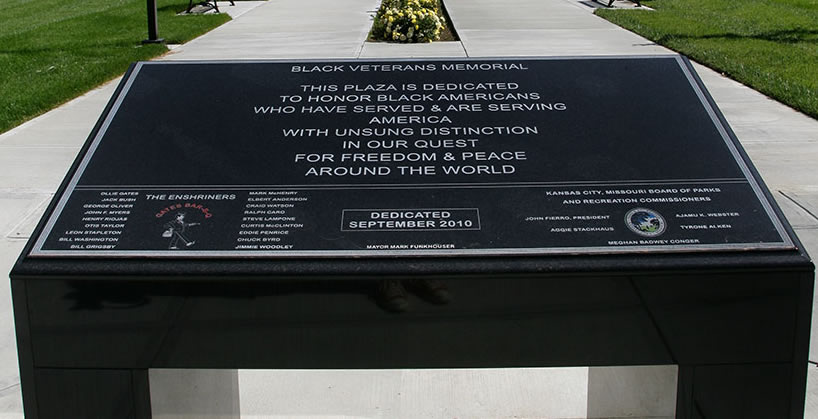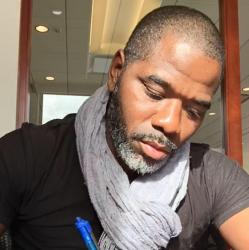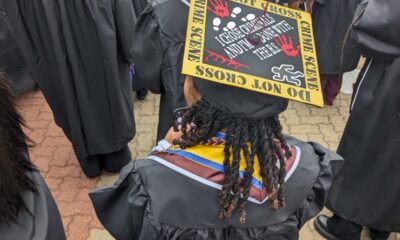News
Three Men Who Served One Country

With air dressed in thick traditions, chocolatey love, and new cucumber water…for the first time in my life, I understood the inherent importance of Memorial Day. As I sat furbished in both contentment and love for and because of the United States’ treatment of Black Veterans including those who had been laid to rest and those who pressed and prepared their Class A uniforms for the last time yesterday, the august recognition this holiday deserves replayed in my mind with a repetition only matched by the tick tocks of a forever clock.
It is not well documented that we, and by we, I mean those of us who are descendants of folk enslaved by this trenchant nation, created the fervor that is Memorial Day. We are familiar, however, with the fact that a large majority of Africans entered through the gates of ports in Charleston, South Carolina as humans only to be lowered to the status of slaves. So it perfectly understandable that this beautiful, yet tortured soil would birth Memorial Day.
Consider the time: it is 1865 and Blacks throughout the nation are experiencing freedom at a breakneck pace. The first of the Reconstruction Amendments was passed officially codifying the prohibition of slavery which Blacks in Texas would finally hear about giving rise to the origin of Juneteenth celebrations. But there was another spectacle, one with less majesty, taking place. This was the mass killing of Union troops who had been held as prisoners of war at Washington Park Race Course in Charleston. While the number is still a topic for debate, it is believed to be somewhere in the neighborhood of two-hundred and sixty soldiers who died and were quickly buried in unmarked graves. But with a nimble urgency, freshly freed Blacks of Charleston organized a May Day Ceremony, that received national coverage, to make proper and perfect the burial site and surrounding areas. It is here that these freedmen built an asylum and arch that read “Martyrs of the Race Course” and gave birth to the idea that those whom sacrificed everything for our freedom deserved to be memorialized. It is also worth noting that around ten-thousand people came that day, the vast majority were Black including three-thousand students that had recently started attending Freedmen Schools.
Now with an unblemished understanding of the holiday, let us give homage to the powerful and living emotions that occurred yesterday as I sat at the proverbial feet of two highly erudite Black men, both veterans like myself, yet each of us served in different militaries. For the oldest, whom I will call “Uncle W.” served in a segregated Army/Air-Corp during WWII and the Korean War (he saw battle in both). The second, whom I will call “Papa N.”, served in a newly integrated Airforce during the Vietnam Conflict (he was blessed not to see the jungle). And of course, I was in the military at the end of the 20th century and the dawn of the 21st century when there were no wars.
I assumed that the smell of fresh grilled veggies, hotdogs, hamburgers and pulled chicken would be enough to elicit an emotional celebration in itself. However, when food is paired with conversation and a family reunion on the weekend that unofficially opens summer, the senses are only heightened. And so was the case yesterday, as a Southerner both by birth and disposition, my next line may seem sacrilegious, but it must be said. I finally experienced Southern traditions and not the meaningless pleasantries that are status quo, in the south, but all of the great stereotypes I’ve heard and wondered about…and I was hundreds of miles from the geographically delineated South. Hidden behind the shadows of the skyline of the nation’s capital, I listened to stories of seventy-five year marriages, sisters sharing tales of being bussed to segregated schools, nieces and nephews sitting and responding with respect and admiration, people older and younger caring for me because they are wired and connected to humanity in a way that is intrinsically thought to be a Southern thing. We laughed and laughed and did it again twice. I have never felt more welcomed in my entire existence. Every face was new, yet I felt as if I had known them since I was a curious child.
The conversation eventually separated by the sexes, women gathered there and the young men over there, but it was something that needed to be said between the veterans that kept us three right where we were. No one other than God planned this conversation, neither of us could have known that it would have been, but the universe gave space and it was.
Papa N. began the conversation which makes perfect sense as he was the bridge between Uncle W.’s generation and mine. His military legacy read much like the Civil Rights Movement: always confronted with the fact that he was Black and didn’t belong wherever he was because of it. Papa N. was of the age when Black officers were a rarity, but he was one in the Air Force and rather than shrink like some, he confronted racism head on. To me, this was admirable because it is the stance I choose to take as it pertains to issues of race: unapologetically Black. On the other hand, Uncle W. talked of not understanding why so many spoke ill of those times (1940s) as he was stationed in Meridian, Mississippi and had a marvelous time. His point of view was that of a soldier who knew no Black officers, for it was forbade, and he served in segregated units. Uncle W. spoke of his time in Mississippi with a glow that ran counter to the narrative of the racist south. I am convinced that Uncle W.’s view of the south then was molded by the protection awarded him from being only allowed to interact with other Blacks. Even in the community, the soldiers had little interaction with the white population for the base commander ensured they wouldn’t have to use public transportation by allowing access to military vehicles. I, on the hand, served in a military that was supposedly politically corrected and the military neither segregated me nor called me the “N” word, at least not in my presence, but it existed covertly. Uncle W. who is 98 years old and drives a brand new Infinity, spoke of our need for integration, and Papa N. thought integration cost the Black family so much.
I saw light in both. It was not as if Uncle W. wanted to run from other Blacks to live out in the hills with whites, but it was his recognition that they had more resources than Blacks, which at its core is an equity problem. Papa N. with all the passion of a well behaved Black Panther explained to Uncle W. that it wasn’t because Blacks weren’t good business folk instead it had more to do with whites hiding the ball and changing the rules. We talked like this for hours, and not once did anyone lose their cool, talk over another or disregard the next man’s thoughts. I finally knew what American values were, all the talk about life, liberty and pursuit existed right here in our conversation.
These brothers had sacrificed, worked hard, and built community. Not only had that resulted in economic success, but they were supported by women strong enough to carry the world, and they did. They were descendants of men and women who had built they own homes, they still worshipped in their childhood churches, and appreciated love, neighbors, and the greatness of this country, at least what it could be. This is the true legacy of Memorial Day.
Today let it ring true from the top of your taste buds to the bottom of your vocal chords, and in this way we honor those who thought it of grand import to honor those who died for us. And in doing so, we recognize we are indebted to many whose names we will never know.

-

 Featured10 months ago
Featured10 months agoCalifornia Is the First State to Create A Public Alert for Missing Black Youth
-

 Featured10 months ago
Featured10 months agoAfrican American Leaders Stay the Course Amid Calls for President Biden To Bow Out of Race
-

 Featured10 months ago
Featured10 months agoThe Debate Fallout Lands on Both Candidates
-

 Featured9 months ago
Featured9 months agoPresident Joe Biden Decides to Withdraw from the Presidential Race
-

 Featured9 months ago
Featured9 months agoIn One of His Final Speeches as President, Biden Says It’s Time for ‘Fresh Voices’
-

 Featured10 months ago
Featured10 months agoPresident Joe Biden Describes Shooting of Donald Trump As ‘Sick’









